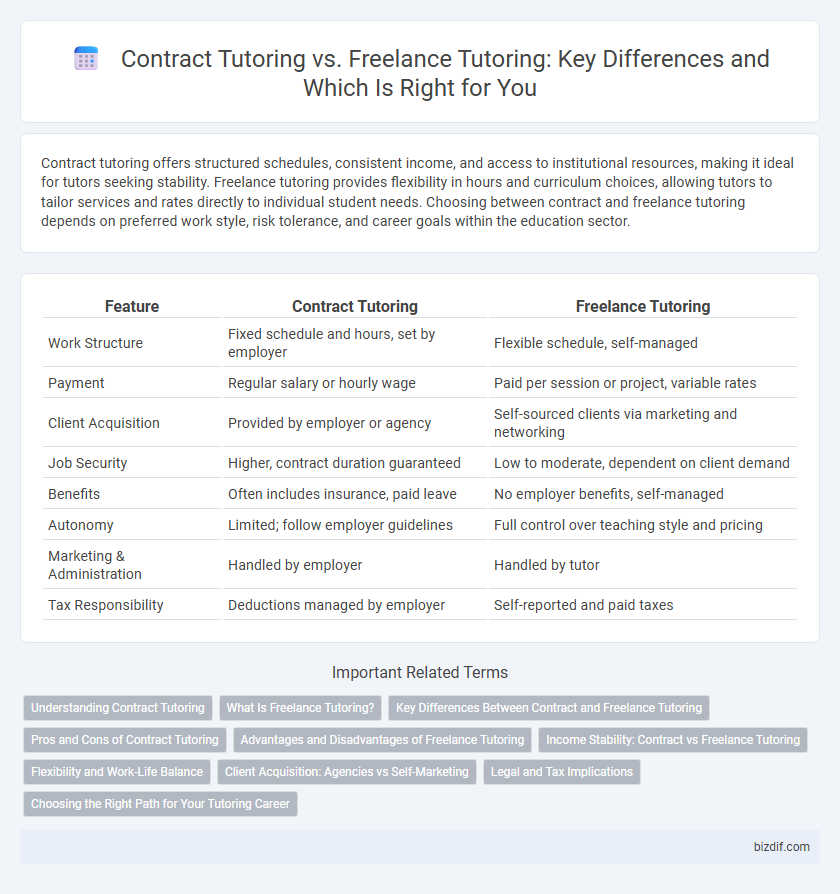Contract tutoring offers structured schedules, consistent income, and access to institutional resources, making it ideal for tutors seeking stability. Freelance tutoring provides flexibility in hours and curriculum choices, allowing tutors to tailor services and rates directly to individual student needs. Choosing between contract and freelance tutoring depends on preferred work style, risk tolerance, and career goals within the education sector.
Table of Comparison
| Feature | Contract Tutoring | Freelance Tutoring |
|---|---|---|
| Work Structure | Fixed schedule and hours, set by employer | Flexible schedule, self-managed |
| Payment | Regular salary or hourly wage | Paid per session or project, variable rates |
| Client Acquisition | Provided by employer or agency | Self-sourced clients via marketing and networking |
| Job Security | Higher, contract duration guaranteed | Low to moderate, dependent on client demand |
| Benefits | Often includes insurance, paid leave | No employer benefits, self-managed |
| Autonomy | Limited; follow employer guidelines | Full control over teaching style and pricing |
| Marketing & Administration | Handled by employer | Handled by tutor |
| Tax Responsibility | Deductions managed by employer | Self-reported and paid taxes |
Understanding Contract Tutoring
Contract tutoring involves a formal agreement between the tutor and an educational institution or agency, specifying terms such as duration, payment, and responsibilities. This structure provides tutors with steady income, defined work hours, and access to resources or training unavailable to freelancers. Understanding contract tutoring helps tutors weigh job security and benefits against the flexibility often found in freelance roles.
What Is Freelance Tutoring?
Freelance tutoring involves independent educators who offer personalized learning sessions without long-term commitments or exclusive contracts. Tutors set their own schedules, rates, and curricula tailored to individual student needs, providing flexibility unavailable in contract-based roles. Platforms like Wyzant and Tutor.com facilitate connections between freelance tutors and students seeking customized academic support.
Key Differences Between Contract and Freelance Tutoring
Contract tutoring involves a formal agreement with a tutoring company or institution, providing stable income, regular hours, and access to resources, while freelance tutoring offers greater flexibility, allowing tutors to set their own rates and schedules but requiring self-promotion and client acquisition. Contract tutors often benefit from structured curricula and administrative support, whereas freelance tutors must manage lesson planning, billing, and marketing independently. Understanding these differences helps tutors choose the model that best fits their career goals and work-life balance preferences.
Pros and Cons of Contract Tutoring
Contract tutoring offers stable income and consistent work schedules, ensuring financial security and reliable client flow. However, it often limits flexibility and creativity due to strict guidelines and expectations set by the contracting agency. Tutors may face restrictions on setting their own rates and selecting clients, which can reduce autonomy compared to freelance tutoring.
Advantages and Disadvantages of Freelance Tutoring
Freelance tutoring offers flexibility in scheduling and the ability to set personalized rates, attracting diverse clients without institutional constraints. However, it requires strong self-marketing skills, managing irregular income, and handling administrative tasks like invoicing and taxes independently. Unlike contract tutoring, freelancers lack job security and benefits such as health insurance and paid leave, which can impact long-term stability.
Income Stability: Contract vs Freelance Tutoring
Contract tutoring offers greater income stability through fixed schedules and guaranteed pay, ensuring consistent monthly earnings. Freelance tutoring income varies with fluctuating client demand and session frequency, leading to irregular cash flow. Tutors seeking predictable revenue often prefer contract arrangements over the variable nature of freelance work.
Flexibility and Work-Life Balance
Contract tutoring offers structured hours and steady income, providing predictability but often limiting flexibility in scheduling. Freelance tutoring grants greater control over work hours and client selection, enhancing work-life balance by accommodating personal commitments. Tutors seeking autonomy tend to prefer freelance roles, while those valuing stability might favor contract positions.
Client Acquisition: Agencies vs Self-Marketing
Contract tutoring through agencies provides consistent client acquisition by leveraging established networks and marketing resources, ensuring steady student referrals without the tutor's direct involvement. Freelance tutors rely heavily on self-marketing strategies such as social media presence, SEO-optimized websites, and local advertising to attract and retain clients independently. While agencies reduce the time spent on client hunting, freelancers benefit from greater control over pricing and personalized brand development.
Legal and Tax Implications
Contract tutoring often involves formal agreements outlining payment terms, responsibilities, and tax withholding, with tutors treated as employees subject to income tax and benefits deductions. Freelance tutoring requires tutors to manage their own tax obligations, including self-employment taxes, and maintain records for deductions and business expenses. Understanding local labor laws and tax regulations is essential to ensure compliance and optimize financial outcomes in both contract and freelance tutoring arrangements.
Choosing the Right Path for Your Tutoring Career
Contract tutoring offers stability with a consistent schedule, fixed pay, and access to established resources, making it ideal for those seeking reliable income and structured support. Freelance tutoring provides flexibility to set rates, choose clients, and design personalized lesson plans, appealing to individuals who prioritize autonomy and entrepreneurial growth. Evaluating your career goals, financial needs, and preferred work style is crucial to determining whether contract or freelance tutoring best aligns with your long-term success.
Contract Tutoring vs Freelance Tutoring Infographic

 bizdif.com
bizdif.com